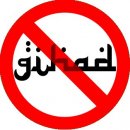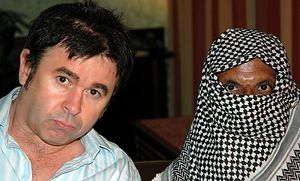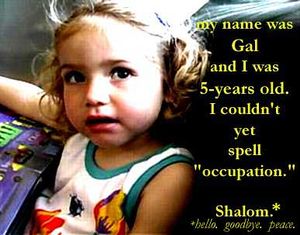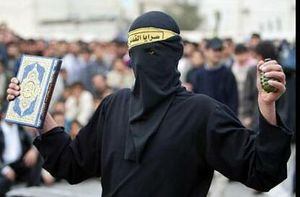Islam and the Abode of War
Alhamdulillah! This page is certified halal! The following article adheres to all known rules of Islamic jurisprudence, and is thus pleasing to Allah. Follow the example of the Prophet (PBUH) and read only certified halal articles, lest you be declared un-Islamic and banished to Jahannam! |
Different divisions of the world have existed in Islamic religion and culture. Some are geo-political divisions which are derived from non-Qu'ranic (Muslims say ‘Qu’ranic’, not ‘Koranic’, because Allah is an Arab) traditions in Islamic culture. These conventions delineate several divisions of the world into what are called ‘Houses’ or Dar - literally ‘place’ in Arabic (which is God’s - or Allah’s - chosen language). Other geographic divisions of the world are described in the Qur’an (or ‘Koran’, if you don’t believe God is an Arab).
The Satanic Introduction[edit | edit source]
Dar al-Islam (the Abode of Islam)[edit | edit source]
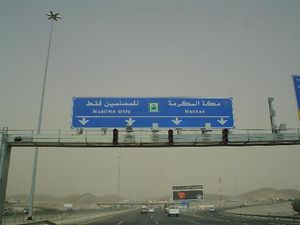
Dar al-Islam (Arabic: دار الإسلام literally house/abode of Islam; or Dar as-Salam, house/abode of Peace; or f Peace]]. Muslim scholars stress the peacefulness of the Abode of Islam and also the happy status of the dhimmis. Some ‘Zionists’ have argued that ‘they would say this, wouldn’t they?’. ‘They are, after all, Islamic scholars.’ Islamic scholars have also emphasised the fact that the Abode of Islam was necessary in order to allow Muslims the right to practice their religion freely. As for the members of other religions, they were allowed to practice their right to watch Muslims practice their religion freely. And that, Islamic scholars have argued, ‘was enough for them’.
The two requirements for a country to be part of Dar al-Islam were, according to the founder of this concept, Abu Hanifa, the following:
- That Muslims must be able to enjoy peace and security with and within this country.
- That Islamic countries have common frontiers with other Muslim countries.
If the former does not apply, then physical means (such as Jihad) can be used to correct the situation. [2] And, in the latter case, individuals are required to do hijra to countries where they can practice their religion.
Muslims must have ‘peace and security’ within their states. In order to ‘secure peace’, all non-Muslim religions must be banned, stamped out or dhimmi-ed. In order to insure ‘security’, Islamic states must increase the power of the military. What the heck! In the cases of Pakistan and Iran, what they really need for ‘security’ is a good old-fashioned (but effective) nuclear bomb. ‘Security’ will be guaranteed, them omnipresent Islamic scholars say, ‘if India and Israel are wiped out’. And who would begrudge a Islamic state the simple desire for ‘security and peace’?
The second requirement ((1) above) has led critics to note a problem. If Muslims, in a specific country, not only require their own state to be Islamic in order ‘to be able to enjoy peace and security within [their] country’, but also require that the countries on the ‘common frontiers’ to be Muslim as well, then, yes, you guessed it, that seems a damn good reason for a good dose of Jihad against such non-Islamic ‘frontier’ countries. Whoops! India is a ‘frontier country’ of Pakistan. Israel is a ‘frontier country’of Allah knows how many Islamic countries. What about the ‘frontier countries’ of Sudan, Somalia, Nigeria, etc.? Is Spain a kind of ‘frontier country’ of those North African Islamic states (even if there is a bit of water in between)? [3]
Muslim scholars [4] maintain that ‘the labelling of a country or place as being a part of Dar al-Islam revolves around the question of religious security’. This means that ‘if a Muslim practices Islam freely in his place of abode, despite the fact that the place happens to be secular or un-Islamic, then he will be considered as living in the Dar al-Islam.’ The only problem with this is that in order for ‘a Muslim to practice Islam freely’ he will need a complete system of sharia, halal meat, plenty of mosques, the banning of all symbols of ‘Western decadence’, etc. in order to bring about the ‘freedom, peace and security he requires’. So the ‘secular or un-Islamic states or areas in which these Muslims live should bloody well get their acts together and start Islamising society in order to give Muslims the peace, freedom and security they require to practice the Religion of Peace’ (as a member of the Muslim Association of Britain put it).
Dar al-Harb (the Abode of War)[edit | edit source]
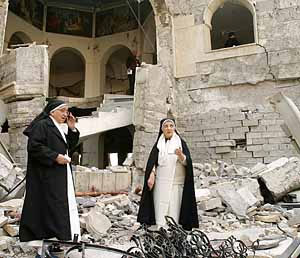
Dar al-Harb (Arabic: دار الحرب ‘house of war’; also referred to as Dar al-Garb ‘house of the West’ in later Ottoman sources; a person from Dar al-Harb is a harbi (Arabic:حربي)) is a term classically referring to those countries where the Muslim law is not in force, in the matter of worship and the protection of the faithful and Dhimmis. The term refers to the relationship between an Islamic state and neighbouring non-Muslim states with whom it has not signed a peace treaty or pact. The ‘peace treaty’ gimmick simply meant that it was taken for granted that Muslims were always at war with non-Muslims – and would be ‘until every last infidel was killed or converted’ (or sometimes, for fun, converted and then killed).
Dar al-Kufr (the Abode of the Kufr/Infidel)[edit | edit source]
Dar al-Kufr (Arabic: دار الكفر, ‘house/domain of disbelief’) is a term used by Muhammad to refer to the Quraish-dominated society of Mecca between his ‘flight to Medina’ and his ‘triumphant return’. Not long after that (about three minutes later), Muhammad not only saw Mecca as a bad place, but also saw the whole damn world as a bad place. That is how he saw everywhere and everyone he had not yet conquered. Very soon after that (about ten minutes after), Muhammad and his followers decreased the ‘domain of disbelief’, Kufr Land, mightily and thereby increased the Domain of Islam.
‘If Muhammad were alive today’, as many Islamists often tell us, ‘he would be well pissed off about how many kufrs there still are’. They continue:
| “ | What have we Muslims being doing wrong since Muhammad’time? | ” |
That is one of the most important questions Islamists and Islamic scholars can ask their fellow Muslims. The answer is that after a few hundred years of Jihad, killing and conquering became a bit of a bore. Muslims actually started doing other things. That is,until the 20th century, give or take a few scraps here and there, when Muslims invented the suicide bomber. ‘The problem with suicide bombers’, the Islamists and Islamic scholars say, ‘is that they only kill hundreds or thousands of kafirs – but there are millions of them!’. Thus ‘Muslims must build better armies as well’. But even better than that. They ‘must get the nuclear bomb’. Iran and Pakistan may already have nuclear bombs – well, they are as near-as-damn-it there. Thus the Islamists ask ordinary Muslims a simple further question:
| “ | What would the Prophet do if he had a nuclear bomb? He would use it! | ” |
‘So who’, they continue, ‘will follow in the footsteps of the Prophet and blow away Israel and then India?’ And ‘that will be just the beginning’. The Islamists, or scholars, add:
‘Any takers? Any clever physicists up for the job? Put your down-payment on Paradise now. And you nuclear scientists, if successful, wont get a mere 77 virgins - you will get at least 210! [6]
For much of Islamic history, the preferred term used to describe non-Islamic societies was dar al-Harb. This emphasised the various Islamic countries' aspirations to conquer such territories and render them part of dar al-Islam. That was in the days when Muslims told the truth about Jihad. They hadn’t much need then of the Islamic notion of Al-Taqiya (i.e., deception, lies, etc. against the kufr) because they Had the Power (as Public Enemy put it). Now ‘moderate’Muslims, such as the Muslim Association of Britain, and just about every non-Islamist Muslim (if there are any), speak in forked tongue to the kafir. Of course not even the MAB can openly say that Muslims ‘want to conquer every kufr country’. No; they can do that in much more al-Taqiya-like ways like blackmailing the Government and calling all critics ‘racists’ or ‘Islamophobes’. Now Muslims can conquer kafir states and countries with the pen; and also with the help of the Guardian, the Socialist Workers Party and all those nice liberals who ‘simply adore brown people’.
Unbelief is One Community[edit | edit source]
A traditional Arabic saying, attributed to Muhammad, goes:
| “ | Unbelief is one community. | ” |
Or, in other words, ‘infidels are of one nation’. This expressed the Islamic view that distinctions between different types of non-Muslims are insignificant when compared to the overriding distinctions between Muslims and non-Muslims. That meant that non-Islamic societies were/are not really Hindu, Christian, secular, atheist, Gothic, at all. No. They are ‘all the same – communities of unbelief’. That must mean that if Mohamed were he alive today, he would think that the distinction between, say, a hard-core atheist and a Hindu, is a mere trifling matter – something for pedantic or ‘bad’ Muslims to think about. (One wonders how Muhammed would see the brain-numbing disagreements between kafir atheists and kafir Christians that have filled the years.) So it appears, to modern-day Mohameds, that Issac Newton has more in common with Silvester Stalone than he has with even a pious Muslim scholar. Actually, that is probably correct.
Dar al-Hudna (the Abode of Calm – not to be confused with a ‘chill-out room’)[edit | edit source]
Dar al Hudna (Arabic: ‘house of calm’): This is the land of non-believers which is currently under a truce - the respite between Islamic wars. This means that these periods of peace with non-Muslims were simply seen, by Muslims, as hiatus between the wars which Muslims and non-Muslims fought. It was/is a time for Muslims to reload their guns, appear on Question Time, write for the Guardian and do more research into nuclear weapons. Traditionally it was also the time when Muslims recovered from a good kicking by the kafir, which has been almost continuously the case since the fall of the Ottoman Empire (according to both non-Muslims and Islamists).
Sometimes, in the past, Muslims accepted a truce between themselves and non-Muslims. But there was a catch - as is usually the case with Muslims and their relations with the kafir. A truce was bought by tribute and harbis. If the harbis refused to pay tribute in exchange for the truce, hostilities were resumed. Allah knew precisely what Muslims deserved, in these days, from the defeated nations - their women folk (but only after they were converted to Islam). And also, of course, a lot of dosh. Furthermore, only treaties that conformed to Islamic prescriptions were valid. If these conditions were not fulfilled, the treaty became worthless. In other words, Muslims said:
| “ | Do what we say. When we say it. Otherwise we will kick your kafir arses! | ” |
Dar al-'Ahd (the Abode of Truce)[edit | edit source]
Dar al-'Ahd (Arabic: دار العهد ‘house of truce’ or Dar al-Sulh ‘house of treaty’) was invented to describe the Ottoman Empire's relationship with its Christian tributary states (nice word that, ‘tributary’). The invention of Dar al-Ahd was deemed necessary by Muslims, as the worldview prevalent at the time did not allow for a protracted peace with non-Muslim states (even those under Muslim domination). So no surprises there! As I have said, ‘peace’ with the non-Muslims, for the Muslims of old, was simply a hiccup or hiatus between the many Muslim-versus-non-Muslim wars. Have you already forgotton that? That is why America, Europe, India, Israel and everywhere (even Belguim) are part of the Abode of War. Keep up.
Today, the term refers to those non-Muslim governments which have armistices or peace agreements with Muslim governments. The actual status of the non-Muslim country in question varied from ‘acknowledged equality’ to ‘tributary status’. Today, India and Israel - amongst many other states - should realise that this ‘armistice’ or ‘peace’ (with Pakistan and Palestine, etc.) is but a preparation for another war in the Abode of War. Actually, Israel and India do already know this. They don’t need to be told.
Dar al-Dawa (the Abode of Invitation)[edit | edit source]
Dar al-Dawa (Arabic: دار الدعوة ‘house of invitation’) was a term used to describe a region where the religion of Islam has recently been introduced. Since the population had not been exposed to Islam before, it did not fit into the traditional definition of dar al-Harv. On the other hand, as the region was not yet fully Muslim, it could not be dar al-Islam either. This is all very nice, of course. The peoples of the ‘houses of invitation’ are nearly-Muslims - so they were not in the Abode of War. However, they were also not-quite-Muslims, which meant that they were not in the Abode of Islam (or Peace) either. In order to be ‘good’ Muslims, they had to turn themselves into Arabs. This is not surprising because, according to all Muslims, Allah is Himself an Arab. He speaks only Arabic. That is why the Koran can only be ‘truly understood’ in its original Arabic. [7]
The most frequent use of the term dar al-Dawa is to describe Arabia before and during the life of Muhammad (commonly referred as Jahiliyyah period - the era of ‘ignorance of divine guidance’). Not only was B.M (Before Muhammad) a ‘period of ignorance’, so too was the A.M (After Muhammad) period, as the Islamists keep telling us. [8]
Dar al-Amn (the Abode of Safety)[edit | edit source]
Dar al-Amn (Arabic: دار الأمن ‘house of safety’) was a term proposed by Western Muslim philosophers to describe the status of Muslims either in the West or in other non-Muslim societies. This is such a happy and smiley term, isn’t it? Much better than ‘the Abode of War’. These ‘Western Muslims’, in the past, found it difficult to argue that they were living in the Abode of War at the very same time as being allowed to practice Islam, as well as being able to say ‘we are living in the Abode of War’. Things are a little different now. They began to change, mainly, in the post-WW2 period. Now Muslims are free to say ‘we are living in the Abode of War’. Indeed they are free to say ‘we are not free, as Muslims’. Some Muslims and Islamists are even allowed to say these things in newspapers like the Guardian (which ‘simply adores brown people’), as well as to very middle-class people (those who don’t like the fact that their fathers, grandfathers, etc. were so, well, middle class, white and Western – just like them, really).
So now Muslims, if only when speaking to the kafir or when on the BBC’s Question Time, can use the term dar al-Amn, in opposition to the older terms dar al-Islam and dar al-Harb (from which it is derived).
References in the Koran and the Hadith[edit | edit source]
It is said (yes, you guessed it, by those Islamic scholars again) that the house of divisions in Islam, such as Dar al-Islam and Dar al-Harb, does not appear in the Koran or the Hadith. However, another set of Islamic scholars says that it does. Critics have said that ‘moderate’ Islamic scholars (if there are any) ‘would say that, wouldn’t they?’ After all, ‘it is also said that each sentence in the Koran has “seven to seventy interpretations”’. The critics continue:
| “ | There is one interpretation for the kufr (or infidel), one for the ordinary Muslim, and seventy-five for those many, many, Islamic scholars to fire at each other. | ” |
Footnotes[edit | edit source]
- ↑ South Africa, in the good old days, springs to mind.
- ↑ ‘Jihad’ means the killing of non-Muslims – just in case you’ve been another planet for the last ten years.
- ↑ What about the "Islamic Republic of Manningham" in Bradford, in the UK? Are Buttershaw, Wibsey, Heaton, and the rest ‘frontier’ areas of the city of Bradford?
- ↑ Yes, that lot again - don’t they keep busy?
- ↑ It seems that the Islamists who did this simply didn't 'embrace diversity' that day.
- ↑ Technicians will still get the mandatory 77.
- ↑ This is not to be confused with the very Jewish God of the Jews, which it is very similar to. Neither is it to be confused with that Roman philosopher’s idea that ‘if the Africans had a god, he too would be snub-nosed and black’.
- ↑ Many Islamists, such as the sex-obsessed Qutb, thought that things went downhill as soon as Mohamed kicked the bucket. This is very strange when one considers ‘how great and true Allah’s words’, in the Koran, were/are meant to be. Why didn’t (bad) Muslims, let alone the kafir, get these great truths of Islam into their heads?



